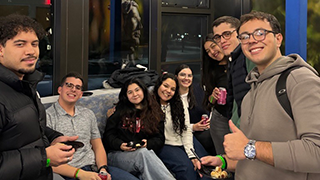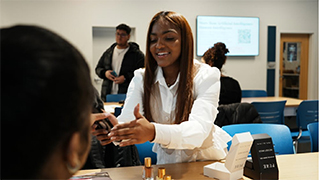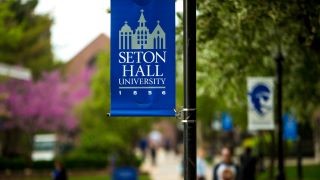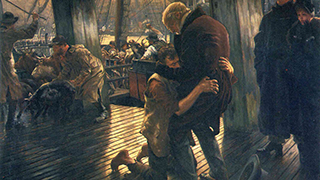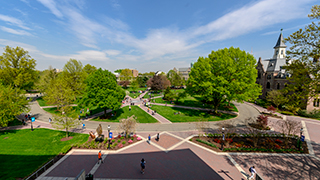Seton Hall Expands Second Degree Accelerated B.S.N. Program
Thursday, December 12, 2024
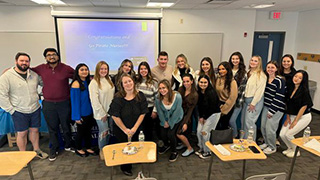
The latest graduates of Seton Hall's Accelerated B.S.N. celebrated in October 2024 at the Freehold location.
The Seton Hall College of Nursing, a longtime trailblazer in nursing education, has expanded its Accelerated Bachelor of Science in Nursing (A.B.S.N) program to better meet the state’s growing need for registered nurses. Beginning in 2025, the Freehold location — previously limited to a Fall start date — will also offer a Spring start date, while the Nutley campus will continue to provide its existing Spring semester option.
The additional cohort in Freehold speaks to the program’s success and the College’s commitment to increasing the number of baccalaureate-prepared R.N.s, according to Interim Dean Kristi Stinson, Ph.D., R.N., A.P.N.-B.C. “New Jersey, like the rest of the U.S., faces a shortage of nurses over the next decade,” she said. “We’re projected to have a shortfall of 25,000 registered nurses in the state by 2036.” That 24% anticipated nursing gap is cited in a 2024 report issued by the U.S. Department of Health and Human Services.
Accelerated Pathway to a Nursing Career
Enter Seton Hall ‘s A.B.S.N. program. The 14-month, 62-credit degree is tailored to
students who hold a non-nursing bachelor’s degree and are eager to join the nursing
profession. The program’s Spring and Fall start dates and two locations in Freehold
and Nutley make it a flexible and appealing choice, said Assistant Program Director
Megan Kushner. Upon completion of the degree, which includes 630 hours of clinical
experience in a range of healthcare and hospital settings, graduates are eligible
to sit for the NCLEX-R.N. licensing exam.
A key differentiator for students is the length of the program. According to Kushner: “Many other programs in the region take an additional two months to complete; Seton Hall’s program is appealing to people who are motivated to earn their B.S.N. efficiently and start their nursing careers.”
Noted Incubator for Nursing Excellence

Joanna Monaco, a student in Seton Hall's Accelerated B.S.N. program, is scheduled to graduate in March 2025 from the Nutley, NJ location.
Joanna Monaco, a Rutgers University graduate with a B.S. in Molecular Biology who is on track to complete the A.B.S.N. degree in March 2025, echoed Kushner’s sentiments. “The Seton Hall A.B.S.N. program lasts 14 months, which is shorter than other programs I considered and made it even more appealing to me. I knew I had the dedication to complete the program in this timeframe successfully,” she said.
Monaco, who worked briefly in pharmaceutical sales, was inspired to pursue her A.B.S.N. by her personal experiences during her father’s diagnosis with Stage 4 lung cancer, and an earlier role as a nursing assistant. “I missed being able to be more hands-on and feeling like I was making a true difference in people’s lives,” she said. Once she investigated her options, Seton Hall’s A.B.S.N. became her first choice based on its noted excellence in nursing education and career development.
“I chose Seton Hall because their mission is to prepare students to be leaders and innovators in the profession, which aligns with my goals in the future,” Monaco said. “Seton Hall’s A.B.S.N. program is accredited by the Commission on Collegiate Nursing Education (CCNE) and the New Jersey Board of Nursing, which I knew would lead me to great career opportunities.”
Clinical Diversity and Faculty Support
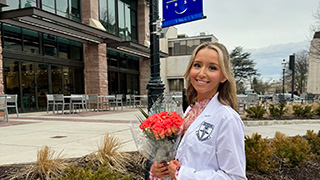
Nicolette Perera, who graduated in October 2024 from the Freehold location, is now an R.N. in a NICU unit.
For newly minted graduate Nicolette Perera — who completed the Freehold program in October and started a job in a neonatal ICU unit — early exposure to clinical rotations was a key factor in choosing Seton Hall’s A.B.S.N. “The program begins clinicals in the first semester,” she noted. “This was an important point I considered when choosing a nursing school because the rotations offer such a valuable learning experience for students.”
Perera added, “My instructors did a phenomenal job teaching us on medical-surgical floors, while rotating us through various specialties in the hospital. We spent time in ICUs, the emergency department, pediatrics, labor and delivery/postpartum, among others.”
Perera, who holds a B.S. in Psychology from Rutgers, said that Seton Hall’s supportive faculty guided her professional development with care: “Our instructors made sure we understood the ‘why’ behind every medication and intervention,” which helped build her professional confidence.
Joanna Monaco added, “The professors here care about us not just as students, but as future nurses.” She noted that while the pace of the A.B.S.N. program is challenging, the faculty support has made her leap into nursing achievable: “Every professor has made this program feel manageable.”
Categories: Health and Medicine


